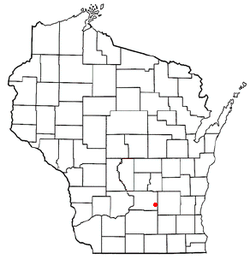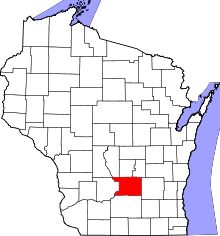Fall River, Wisconsin
| Fall River, Wisconsin | |
|---|---|
| Village | |
 Location of Fall River, Wisconsin | |
| Coordinates: 43°23′7″N 89°2′45″W / 43.38528°N 89.04583°WCoordinates: 43°23′7″N 89°2′45″W / 43.38528°N 89.04583°W | |
| Country | United States |
| State | Wisconsin |
| County | Columbia |
| Area[1] | |
| • Total | 1.92 sq mi (4.97 km2) |
| • Land | 1.86 sq mi (4.82 km2) |
| • Water | 0.06 sq mi (0.16 km2) |
| Elevation[2] | 856 ft (261 m) |
| Population (2010)[3] | |
| • Total | 1,712 |
| • Estimate (2012[4]) | 1,696 |
| • Density | 920.4/sq mi (355.4/km2) |
| Time zone | Central (CST) (UTC-6) |
| • Summer (DST) | CDT (UTC-5) |
| Area code(s) | 920 |
| FIPS code | 55-25150[5] |
| GNIS feature ID | 1564844[2] |
| Website | http://fallriverwi.com/ |
Fall River is a village in Columbia County, Wisconsin, United States, along the North Fork of the Crawfish River. The population was 1,712 at the 2010 census. It is part of the Madison Metropolitan Statistical Area.
History
Fall River was originally settled by Yankee settlers from New England who were descended from the English Puritans that settled New England in the 1600s. One influential Yankee settler in Fall River was a man named Alfred Brayton. Alfred Brayton named the town after his father's family's home town of Fall River, Massachusetts.[6]
Geography
Fall River is located at 43°23′7″N 89°2′45″W / 43.38528°N 89.04583°W (43.385346, -89.045818).[7]
According to the United States Census Bureau, the village has a total area of 1.92 square miles (4.97 km2), of which, 1.86 square miles (4.82 km2) of it is land and 0.06 square miles (0.16 km2) is water.[1]
Demographics
| Historical population | |||
|---|---|---|---|
| Census | Pop. | %± | |
| 1850 | 126 | — | |
| 1870 | 259 | — | |
| 1910 | 360 | — | |
| 1920 | 400 | 11.1% | |
| 1930 | 375 | −6.2% | |
| 1940 | 425 | 13.3% | |
| 1950 | 479 | 12.7% | |
| 1960 | 584 | 21.9% | |
| 1970 | 633 | 8.4% | |
| 1980 | 850 | 34.3% | |
| 1990 | 842 | −0.9% | |
| 2000 | 1,097 | 30.3% | |
| 2010 | 1,712 | 56.1% | |
| Est. 2015 | 1,682 | [8] | −1.8% |
2010 census
As of the census[3] of 2010, there were 1,712 people, 617 households, and 461 families residing in the village. The population density was 920.4 inhabitants per square mile (355.4/km2). There were 671 housing units at an average density of 360.8 per square mile (139.3/km2). The racial makeup of the village was 96.0% White, 0.7% African American, 0.1% Native American, 1.0% Asian, 0.4% from other races, and 1.9% from two or more races. Hispanic or Latino of any race were 2.0% of the population.
There were 617 households of which 44.4% had children under the age of 18 living with them, 54.9% were married couples living together, 12.5% had a female householder with no husband present, 7.3% had a male householder with no wife present, and 25.3% were non-families. 18.2% of all households were made up of individuals and 4.3% had someone living alone who was 65 years of age or older. The average household size was 2.77 and the average family size was 3.14.
The median age in the village was 32.5 years. 31.1% of residents were under the age of 18; 8.6% were between the ages of 18 and 24; 31.5% were from 25 to 44; 21.6% were from 45 to 64; and 7.1% were 65 years of age or older. The gender makeup of the village was 49.3% male and 50.7% female.
2000 census
As of the census[5] of 2000, there were 1,097 people, 418 households, and 290 families residing in the village. The population density was 756.3 people per square mile (292.1/km²). There were 459 housing units at an average density of 316.5 per square mile (122.2/km²). The racial makeup of the village was 98.63% White, 0.55% African American, 0.09% Native American, 0.27% Asian, and 0.46% from two or more races. Hispanic or Latino of any race were 0.55% of the population.
There were 418 households out of which 38.0% had children under the age of 18 living with them, 58.1% were married couples living together, 8.4% had a female householder with no husband present, and 30.4% were non-families. 23.2% of all households were made up of individuals and 11.0% had someone living alone who was 65 years of age or older. The average household size was 2.62 and the average family size was 3.15.
In the village the population was spread out with 29.4% under the age of 18, 7.6% from 18 to 24, 34.4% from 25 to 44, 17.9% from 45 to 64, and 10.8% who were 65 years of age or older. The median age was 33 years. For every 100 females there were 96.9 males. For every 100 females age 18 and over, there were 94.0 males.
The median income for a household in the village was $46,597, and the median income for a family was $54,271. Males had a median income of $35,739 versus $26,161 for females. The per capita income for the village was $19,257. About 4.1% of families and 5.2% of the population were below the poverty line, including 5.4% of those under age 18 and 17.4% of those age 65 or over.
Notable people
- William H. Proctor, Wisconsin state legislator and farmer, lived in Fall River.[10]
References
- 1 2 "US Gazetteer files 2010". United States Census Bureau. Retrieved 2012-11-18.
- 1 2 "US Board on Geographic Names". United States Geological Survey. 2007-10-25. Retrieved 2008-01-31.
- 1 2 "American FactFinder". United States Census Bureau. Retrieved 2012-11-18.
- ↑ "Population Estimates". United States Census Bureau. Retrieved 2013-06-24.
- 1 2 "American FactFinder". United States Census Bureau. Retrieved 2008-01-31.
- ↑ Encyclopedia of Wisconsin, Somerset Publishers, 1990, page 218
- ↑ "US Gazetteer files: 2010, 2000, and 1990". United States Census Bureau. 2011-02-12. Retrieved 2011-04-23.
- ↑ "Annual Estimates of the Resident Population for Incorporated Places: April 1, 2010 to July 1, 2015". Retrieved July 2, 2016.
- ↑ "Census of Population and Housing". Census.gov. Retrieved June 4, 2015.
- ↑ 'Wisconsin Blue Book 1882,' Biographical Sketch of William Henry Proctor, pg. 542
External links
- Fall River Official Website
- Fall River School District
- Sanborn fire insurance map: 1915
